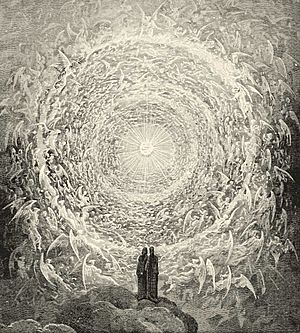Meaning of life facts for kids

Have you ever wondered why we are here? Or what the point of life is? This big question is called the meaning of life. People have thought about it for thousands of years. Many different religions, ways of thinking, and creative people have tried to find an answer. But there isn't one simple answer that everyone agrees on.
Some people believe we might never truly know the meaning of life. Others think that life's meaning is something we create for ourselves. There are many different ideas, and each person might find their own special answer.
Contents
What is the Meaning of Life?
The meaning of life is a deep question about the purpose and value of living. It asks why we exist and what we should do with our time on Earth. It's a question that makes us think about our goals, our happiness, and our place in the world.
Different Ideas About Life's Purpose
People have many different ideas about what life means.
- Some think life is like a big challenge. They believe we are here to overcome difficulties and grow stronger.
- Others focus on relationships. They say the most important thing is the connections we make with family and friends.
- Some people see life as full of hope and happiness. They believe the meaning is to enjoy every moment and spread kindness.
- Achieving goals is another popular idea. For these people, life's meaning comes from setting aims and working hard to reach them.
- A famous writer named Douglas Adams jokingly said the answer to everything is 42. This shows that sometimes, the answer might be unexpected or even funny!
- From a science point of view, the meaning of life for living things is to have children. This helps pass on their genes to the next generation.
- Many people believe the meaning of life is simply to live it to the fullest. This means enjoying experiences, learning new things, and making the most of every day.
- Some also say that the meaning of life is to give life a meaning. This means you decide what is important to you.
- The ancient writer Solomon once wrote that life can feel "useless" sometimes. This idea, found in the book of Ecclesiastes, suggests that some people feel life's efforts can be frustrating or lead to nothing lasting.
How Religions Explain Life's Meaning
Many religions offer answers to the question of life's meaning. They often teach that there is a higher purpose or a divine plan.
- For example, in many religions, people believe they are here to follow certain rules. They might believe they are here to worship a god or gods.
- Some religions teach about an afterlife. This means that life on Earth is a journey towards something more.
- They might also teach about being good to others. Many religions believe that helping people and living with kindness is a key part of life's meaning.
How Philosophy Explores Life's Meaning
Philosophy is a way of thinking deeply about big questions. Philosophers have explored the meaning of life for centuries.
- Some philosophers focus on happiness. They believe the meaning of life is to find joy and contentment.
- Others think about what is right and wrong. They believe life's meaning comes from living a good and moral life.
- Some philosophers, like Immanuel Kant, focused on duty and reason. They believed that humans have a special ability to think and make choices, and that our purpose is to use this ability wisely.
- Thinkers like Jeremy Bentham focused on making the most happiness for the most people. This idea is called utilitarianism.
- There's also a way of thinking called Existentialism. This idea suggests that life doesn't have a meaning built into it. Instead, we are free to create our own meaning through our choices and actions. This can sometimes feel a bit scary, like in Edvard Munch's painting The Scream, which shows a feeling of being overwhelmed by life's big questions.
Finding Your Own Meaning
Ultimately, the meaning of life is a very personal journey. What is important to one person might be different for another.
- You might find meaning in your hobbies.
- You might find it in helping others.
- You might find it in learning new things.
- It could be about making a difference in the world.
- Or it could simply be about enjoying the small moments.
There is no single "right" answer. The journey of discovering what gives your life meaning is part of the adventure of growing up.
Images for kids
-
DNA, the molecule containing the genetic instructions for the development and functioning of all known living organisms.
-
The metric expansion of space. The inflationary epoch is the expansion of the metric tensor at left.
-
Plato and Aristotle in The School of Athens fresco by Raphael. Plato is pointing heavenwards to the sky, and Aristotle is gesturing to the world.
-
Immanuel Kant is regarded as one of the most influential thinkers of the late Enlightenment.
-
Edvard Munch's The Scream, a representation of existential angst.
-
The "Happy Human" symbol representing secular humanism.
-
Symbols of the three main Abrahamic religions – Judaism, Christianity, and Islam.
-
Christ the Redeemer statue on Corcovado mountain in Rio de Janeiro is symbolic of Christianity, illustrating the concept of seeking redemption through Jesus Christ.
-
A golden Aum written in Devanagari. The Aum is sacred in Hindu, Jain and Buddhist religions.
-
Charles Allan Gilbert's All is Vanity, an example of vanitas, depicts a young woman amidst her makeup and perfumes, preoccupied with her own beauty at the mirror of her vanity. But all is positioned in such a way as to make the image of a skull appear, expressing memento mori, that no matter how good she looks, it won't last, as death is inevitable.
-
Hamlet meditating upon Yorick's skull has become the most lasting embodiment of the imagery of vanitas, conveying the theme memento mori ('Remember you shall die'). Whatever the meaning of life, it (life) is fleeting.
See also
 In Spanish: Sentido de la vida para niños
In Spanish: Sentido de la vida para niños
 | Janet Taylor Pickett |
 | Synthia Saint James |
 | Howardena Pindell |
 | Faith Ringgold |













